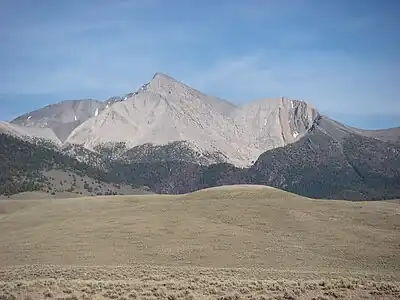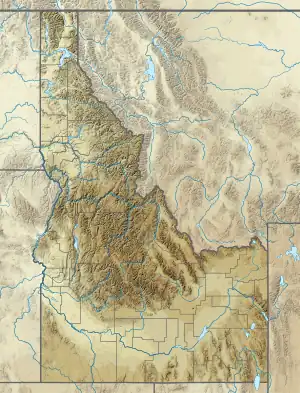Borah Peak
Borah Peak, also known as Mount Borah or Beauty Peak, is the highest mountain in the U.S. state of Idaho[4] and one of the most prominent peaks in the contiguous United States.[5] It is located in the central section of the Lost River Range, within the Challis National Forest in eastern Custer County. On February 11, 2021, the USGS officially recognized Mt. Borah as Idaho's only active glacier.[6]
| Borah Peak | |
|---|---|
 Mount Borah, August 2009 | |
| Highest point | |
| Elevation | 12,662 ft (3,859 m) |
| Prominence | 5,982 ft (1,823 m)[1] |
| Listing | |
| Coordinates | 44°08′15″N 113°46′52″W[2] |
| Geography | |
 Borah Peak Idaho, U.S. | |
| Location | Custer County, Idaho, U.S. |
| Parent range | Lost River Range |
| Topo map | USGS Borah Peak |
| Climbing | |
| First ascent | 1912 by T.M. Bannon[3] |
| Easiest route | Class 3 Scramble |
Description

The mountain was nameless until it was discovered to be higher than Hyndman Peak, previously regarded as the state's highest point. In February 1934, the U.S. Geological Survey named it for William Borah,[7] the prominent senior U.S. Senator from Idaho, who had served for nearly 27 years at the time and was dean of the Senate. An outspoken isolationist, the "Lion of Idaho" ran for president two years later in 1936, but did not win the Republican nomination, and died in office in 1940.[8]
Climate
| Climate data for Borah Peak 44.1341 N, 113.7832 W, Elevation: 11,745 ft (3,580 m) (1991–2020 normals) | |||||||||||||
|---|---|---|---|---|---|---|---|---|---|---|---|---|---|
| Month | Jan | Feb | Mar | Apr | May | Jun | Jul | Aug | Sep | Oct | Nov | Dec | Year |
| Average high °F (°C) | 18.8 (−7.3) |
18.1 (−7.7) |
22.1 (−5.5) |
26.9 (−2.8) |
36.5 (2.5) |
46.3 (7.9) |
58.0 (14.4) |
57.6 (14.2) |
48.8 (9.3) |
35.8 (2.1) |
23.6 (−4.7) |
17.9 (−7.8) |
34.2 (1.2) |
| Daily mean °F (°C) | 10.9 (−11.7) |
9.1 (−12.7) |
12.3 (−10.9) |
16.3 (−8.7) |
25.0 (−3.9) |
33.8 (1.0) |
44.3 (6.8) |
43.8 (6.6) |
35.5 (1.9) |
24.8 (−4.0) |
15.5 (−9.2) |
10.2 (−12.1) |
23.5 (−4.7) |
| Average low °F (°C) | 3.0 (−16.1) |
0.1 (−17.7) |
2.4 (−16.4) |
5.6 (−14.7) |
13.5 (−10.3) |
21.3 (−5.9) |
30.6 (−0.8) |
29.9 (−1.2) |
22.1 (−5.5) |
13.8 (−10.1) |
7.5 (−13.6) |
2.5 (−16.4) |
12.7 (−10.7) |
| Average precipitation inches (mm) | 4.37 (111) |
4.13 (105) |
5.03 (128) |
5.11 (130) |
5.20 (132) |
3.92 (100) |
1.67 (42) |
1.60 (41) |
2.44 (62) |
3.64 (92) |
4.12 (105) |
4.99 (127) |
46.22 (1,175) |
| Source: PRISM Climate Group[9] | |||||||||||||
1983 earthquake
The 1983 Borah Peak earthquake occurred on Friday, October 28, at 8:06:09 MDT in the Lost River Range at Borah Peak in central Idaho, United States, measuring 6.9 on the moment magnitude scale. Mount Borah rose about 1 foot (30 cm) and the Lost River Valley in that vicinity dropped about 8 feet (2.4 m).[10] The peak was scarred on the western side, and the mark is still visible. Two children in Challis were the only fatalities of the quake, struck by falling masonry while walking to elementary school.[11][12]
Climbing
The normal route involves ascending 5,262 vertical feet (1,604 m) from the trailhead to the summit in just over 3.5 miles (5.6 km). This route on the southwest ridge, the most popular route, is a strenuous hike for the most part until one reaches a Class 4 arête just before the main summit crest. This point is known as Chickenout Ridge as many people will abort the attempt once they see the hazards up close. In the cooler seasons this crossing usually involves a traverse over snow, with steeply slanting slopes on either side. An ice axe, and the ability to use it, is recommended for this section when icy.
Borah Peak's north face is one of Idaho's only year-round snow climbs and provides a much greater challenge than the normal route. The face features a number of grade II class 5 routes on mixed terrain.
Three climbers are known to have died on Borah Peak. Two climbers, Vaughn Howard and Guy Campbell, ascended the northwest ridge on November 24, 1977, and were killed in an avalanche. The bodies were not recovered for 9 months, until August 26, 1978.[13][14] Ten years later on June 13, 1987, another climber, Dave Probst, died on a glissade.[3][15][16]
See also
References
- "Borah Peak, Idaho". Peakbagger.com. Retrieved April 8, 2008.
- "Beauty Reset". NGS Data Sheet. National Geodetic Survey, National Oceanic and Atmospheric Administration, United States Department of Commerce. Retrieved April 8, 2008.
- "Borah Peak". IdahoSummits.com. Retrieved December 27, 2008.
- "Elevations and Distances in the United States". United States Geological Survey. April 29, 2005. Archived from the original on January 16, 2008. Retrieved March 28, 2009.
- "USA Lower 48 Top 100 Peaks by Prominence". Peakbagger.com. Retrieved May 4, 2012.
- "Idaho's only glacier formally recognized by USGS". February 26, 2021.
- "Named for solon: Idaho's highest mountain be called "Borah Peak"". Lewiston Morning Tribune. Idaho. Associated Press. February 12, 1934. p. 1.
- "Idaho's highest peak eternal memorial to Borah". Lewiston Morning Tribune. Idaho. January 26, 1940. p. 1.
- "PRISM Climate Group, Oregon State University". PRISM Climate Group, Oregon State University. Retrieved September 28, 2023.
To find the table data on the PRISM website, start by clicking Coordinates (under Location); copy Latitude and Longitude figures from top of table; click Zoom to location; click Precipitation, Minimum temp, Mean temp, Maximum temp; click 30-year normals, 1991-2020; click 800m; click Retrieve Time Series button.
- "Geologic Activity - Craters Of The Moon National Monument & Preserve (U.S. National Park Service)". www.nps.gov. Retrieved August 21, 2016.
- Sher, Jeff (October 29, 1983). "Killer quake rocks Northwest". Spokesman-Review. (Spokane, Washington). p. 1.
- "Quake jolts 8 states, kills 2 children". Eugene Register-Guard. (Oregon). (Los Angeles Times). October 29, 1983. p. 1A.
- "Final search effort set". Idaho State Journal. Pocatello. Associated Press. December 1, 1977. Retrieved September 22, 2019.
- "Climbers' bodies recovered from peak". Lewiston Morning Tribune. (Idaho). Associated Press. August 27, 1978. p. 2A.
- "Searchers still can't find climber". Idahonian. (Moscow). Associated Press. June 15, 1987. p. 5.
- "AAC Publications - Fall on Snow, Loss of Control—Voluntary Glissade, Avalanche, Inadequate Equipment, Weather, Idaho, Mount Borah". publications.americanalpineclub.org.
External links
- Borah Peak Detailed Guide & Trip Report from Mountainouswords.com
- Mount Borah Climbing Guide - photos of the normal route
- Borah Peak Trip Report
- Faulting information